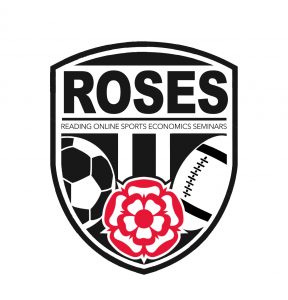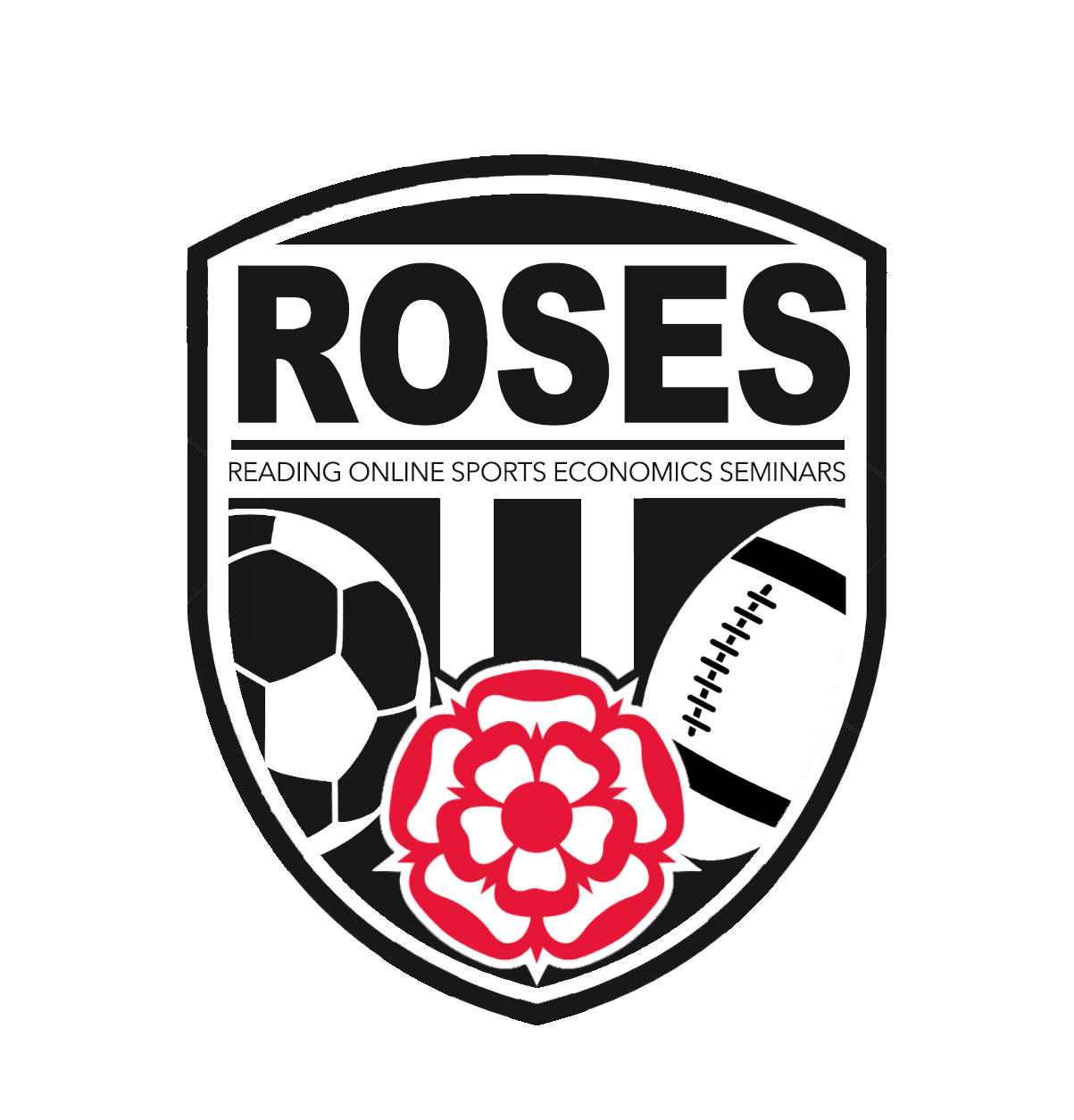 An online series of sport economics seminars, organised by James Reade (@jjreade), Carl Singleton (@csingletonecon) and Adrian Bell, part of the Football Research Group at the University of Reading.
An online series of sport economics seminars, organised by James Reade (@jjreade), Carl Singleton (@csingletonecon) and Adrian Bell, part of the Football Research Group at the University of Reading.
All Seminars take place on Fridays at 2:30-4pm, UK time, on Microsoft Teams (see programme and past recordings below, also on YouTube).
Upcoming Seminars
See here for posters: https://twitter.com/jjreade/status/1244635371973029888/photo/1
- January 8 Georg Stadtmann, Europa-Universität Viadrina, “Fortnite: The Business Model Pattern Behind the Scene”.
- January 15 Mario Lackner, Johannes Kepler Universitaet Linz, “Do male managers increase risk-taking of female teams? Evidence from the NCAA”.
- January 22 S-TRAINING-ROSES @ 3PM Laurent Malisoux, Luxembourg Institute of Health, “Shoe cushioning, body mass and running biomechanics as risk factors for running injury: A randomised trial with 800+ recreational runners”.
- January 29 Marius Otting, Universität Bielefeld, “Exploratory analysis of in-game betting dynamics”.
- February 5 Nathan Ashby, University of Texas at El Paso, “Big Swimmer in a Small Pond or Small Swimmer in a Big Pond? Evidence of Peer Effects from High School Competition Realignments”.
- February 12 Ryan Pinheiro, University of Michigan, “All Runs Are Created Equal: Labor Market Efficiency in Major League Baseball”.
- February 19 S-TRAINING-ROSES @ 3pm, speaker and title TBC.
- February 26 Peter Dolton, University of Sussex, “Is Football a Matter of Life and Death – Or is it more Important than that?”
- March 5 Rob Simmons, Lancaster University, Title TBC.
- March 12 Jan van Ours, Erasmus School of Economics Rotterdam, “Common International Trends in Football Stadium Attendance”.
- March 19 S-TRAINING-ROSES @ 3pm, speaker and title TBC.
- March 26 Wray Vamplew, University of Stirling, “The Emergence of Commercialisation in Sport (Or Was It Always There?)”.
Joining instructions: Seminar via Microsoft Teams. Contact James Reade at j.j.reade@reading.ac.uk
See here for more information about the Department of Economics: https://research.reading.ac.uk/economics/ and the Football Economics Research Group: https://research.reading.ac.uk/football-research/
Past Seminars (Recordings Below and on Youtube):
March 27: James Reade, University of Reading, “Demand and Decision Making in the COVID-19 Pandemic: A Case Study of European Football”, work with Carl Singleton.
April 3: Alex Krumer, Molde University College, “Nationalistic bias among international experts: Evidence from professional ski jumpers”, work with Felix Otto and Tim Pawlowski.
April 17: Stefan Szymanski, University of Michigan, “Covid-19 and football club insolvency”.
April 24: Bernd Frick, University of Paderborn, “Competition Format, Prize Money and Self-Selection: Empirical Evidence from Show Jumping”, work with Enja Herdejürgen.
May 1: Ruud Koning, University of Groningen, “Wrapping up the Leagues”.
May 8: Dennis Coates, University of Maryland, “Salary Distribution and Team Performance in MLS Soccer”.
May 15: Jorge A. Tovar, University de los Andes / University of Wisconsin, Madison, “Emotions and Performance: A Quasi Natural Experiment from the FIFA World Cup.”
May 22: Jamin Speer, University of Memphis, “The Consequences of Relegation and Promotion in European Soccer Leagues: A Regression Discontinuity Approach”
May 29: Johan Rewilak, Aston University, “The designated player policy rule and attendance demand in US Soccer”
June 5: Brad Humphries, West Virginia University, “Do Sporting Events Amplify Influenza Transmission? Causal Evidence from US Professional Team Sports”
May 29 Johan Rewilak, Aston University, “The designated player policy rule and attendance demand in US Soccer”
June 5 Brad Humphreys, West Virginia University, “Do Sporting Events Amplify Influenza Transmission? Causal Evidence from US Professional Team Sports”
June 12 David Ong, Jinan University-University of Birmingham Joint Institute, “The College Admissions Contribution to the Labour Market Beauty Premium”
June 19 Daniel Torchia, Università degli Studi di Torino: “Critical performativity in an alternative football club – The case of FC United of Manchester”
June 26, Mario Lackner, University of Linz, “Mass Gatherings Contributed to Early COVID-19 Spread: Evidence from US Sports”
July 3, Dmitry Dagaev, Higher School of Economics, “Strategic Broadcasting of a Championship: to Earn More from Ads or to Incentivize Subscription?”
July 10, Maria Kotikova, Higher School of Economics, “Gender Differences in Economic Behavior of Football Fans in Russia”
July 17, 2:30pm Alex Farnell, Lancaster University, “Assessing the Role of Fatigue and Multitasking on Worker Performance: Evidence from MLB pitchers”.
July 17, 3:30pm Daniel Weimar, University of Duisburg-Essen, “Against the Main Stream: Field Evidence on a Positive Link Between Media Consumption and the Demand for Sports Among Children”.
July 24, Greg Howard, University of Illinois, “Rational Inattention in the Infield”.
July 31, 2:30pm Jean-Louis Foulley, Université de Montpellier, “Assessment of probability forecasts of C1 group stage outcomes based on scoring rules”.
July 31, 3:30pm Vincenzo Alfano, University of Napoli Federico II, “In hoc signo vinces: An exploratory study on the impact of religion on violence in sport”.
August 7, Matheus Galdino, German Sport University, “Gambling with leadership succession in Brazilian football: a scientific evaluation of head coach turnovers and their impact on team performance”.
August 14, 2:30pm Pramod Kumar Sur, Asian Growth Research Institute (AGI), “Who should be the leader? Vertical Diversity and Team Performance”.
August 14, 3:30pm Nola Agha, University of San Francisco, “The labor economics of player development in professional baseball”.
August 21, Tim Pawlowski, University of Tübingen, “Individual Labor Market Effects of Local Public Expenditures on Sports”.
August 28, Sam Hoey, Erasmus School of Economics, “Who profits from transfers?”
September 4, Scott Kaplan, UC Berkeley, “Entertainment Utility from Non-Instrumental Information: Evidence from Consumer Attention”.
September 11, Bernd Frick, University of Paderborn, “Gender Differences in Sensation-Seeking Behavior: Empirical Evidence from Extreme Sports”.
September 18, Dane McCarrick, University of Leeds, “Home Advantage during the Covid-19 pandemic: analyses of
European soccer leagues”.
September 25, Justus Haucap, Düsseldorf Institute for Competition Economics, “Does crowd support drive the home
advantage in professional soccer? Evidence from German ghost games during the COVID-19 pandemic”.
October 2, Stefan Szymanski, University of Michigan, “On the incidence of an ad valorem tax: the adoption of VAT in
the UK and cost pass through by English football clubs”.
October 9, James Reade, University of Reading, “Mass Outdoor Events and the Spread of a Virus: English Football and C-19”.
October 16, Dimitris Karlis, Athens University of Economics and Business, “Uncertainty in competitive balance: a
model based approach”.
October 23, Reio Tanji, Osaka University, “Reference Dependence and Monetary Incentives: Evidence from Major
League Baseball”.
October 30, Mobolaji Alabi, University of Reading, “The financial impact of Financial Fair Play regulation: Evidence
from the English Premier League”.
November 6, Juan D. Moreno-Ternero, Universidad Pablo de Olavide, “Broadcasting La Liga”.
November 13, John Whitehead, Appalachian State University, “Beyond ghost games: The value of attendance with masking and social distancing in U.S. professional sports”.
November 20, Petr Parshakov, Higher School of Economics, “Job Change and Productivity: The Effect of High Performance Expectations”.
November 27, Alex Farnell, Lancaster University, “Special Ones? The Effect of Head Coaches on Football Team Performance”.
December 4, James Reade, University of Reading, “Reviewing the Video Assistant Referee”.
December 11, Roger Titford, “England’s first football boom 1872-1914 and its 21st century parallels”.
December 18, Georgios Nalbantis, University of Tübingen, “Substitution effects between international soccer telecasts”.

